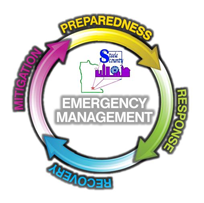Directed Net Procedures
During a communications emergency, stations should operate in a Directed Net. When the communication emergency is declared, any station should assume responsibility for being the Net Control Station (NCS). The role of NCS can be passed on to another station as the event continues.
The responsibility of the NCS include:
- Act as a traffic cop for all communications. All stations should communicate only with the NCS unless unless granted permission.
- Prioritizes communications (e.g., Emergency, Routine, Health & Welfare).
- Log communications, assignments, and activities.
- Log stations as they check-in, noting their status and location.
- Assign tactical call signs, if necessary.
Stations operating in the net should:
- Communicate only with the NCS, unless directed otherwise.
- Do not tie the frequency up with idle chatter.
- Listen much and transmit little, pausing between transmissions.
General operating techniques include:
- Always know your location. If you are moving around, always keep a sharp lookout for landmarks.
- When you are on the fringes of communications, look for a receiving “hot spot” site and use it.
- Repeat the message you think you heard. This will allow the sender to confirm the message was understood properly.
- If you cannot respond to the call immediately, then tell the other station to “stand by.”
- Use plain English, avoid slang, CB terms, 10 codes, etc.
- When transmitting numbers, always use number sequences as a series of individual numbers (9-8-1-3 vs. Ninety-Eight-Thirteen).
- If a name needs to be transmitted, try to spell it out using phonetics.
- Answer questions directly, do not provide lengthy explanations unless asked.
- Ask to clarify any information you do not understand.Repeat critical information.Confirm the information exchange is correct.Avoid angry comments on the air at all costs.
- Obscene statements are out of place in all communications.
Remember – There is no privacy on the radio:
- Be careful of what you say on the air, and how you say it.
- Only transmit facts, not speculation.
- Many facts will be taken out of context even when carefully identified.
- Never give personal information about a victim.
Updated 09-Sep-2019
